
Jeremy Webster "Fred" Frith is an English multi-instrumentalist, composer, and improviser.

Heiner Goebbels is a German composer, conductor and professor at Justus-Liebig-University in Gießen and artistic director of the International Festival of the Arts Ruhrtriennale 2012–14. His composition Stifters Dinge (2007) received five votes in a 2017 Classic Voice poll of the greatest works of art music since 2000, and writers for The Guardian ranked his composition Hashirigaki (2000) the ninth greatest classical composition of the same period.
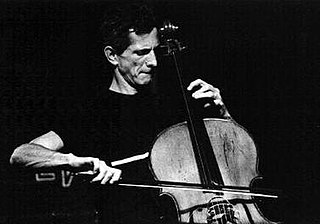
Thomas Henry Corra, better known as Tom Cora, was an American cellist and composer, best known for his improvisational performances in the field of experimental jazz and rock. He recorded with John Zorn, Butch Morris, and the Ex, and was a member of Curlew, Third Person and Skeleton Crew.

Skeleton Crew was an American experimental rock and jazz group from 1982 to 1986, comprising core members Fred Frith and Tom Cora, with Zeena Parkins joining later. Best known for their live improvisation performances where they played various instruments simultaneously, they also recorded two studio albums Learn to Talk (1984) and The Country of Blinds (1986). The group drew on music and themes from a number of sources, including world music, left-wing politics and pre-recorded tapes.
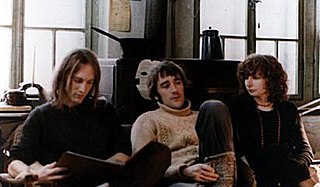
Art Bears were an English avant-rock group formed during the disassembly of Henry Cow in 1978 by three of its members, Chris Cutler, Fred Frith and Dagmar Krause. The group released three studio albums between 1978 and 1981, and toured Europe in 1979.

Henry Cow were an English experimental rock group, founded at the University of Cambridge in 1968 by multi-instrumentalists Fred Frith and Tim Hodgkinson. Henry Cow's personnel fluctuated over their decade together, but drummer Chris Cutler, bassist John Greaves, and bassoonist/oboist Lindsay Cooper were important long-term members alongside Frith and Hodgkinson.

Dagmar Krause is a German singer, best known for her work with avant-rock groups including Slapp Happy, Henry Cow, and Art Bears. She is also noted for her coverage of songs by Bertolt Brecht, Kurt Weill and Hanns Eisler. Her unusual singing style makes her voice instantly recognisable and has defined the sound of many of the bands with whom she has worked.

Chris Cutler is an English percussionist, composer, lyricist and music theorist. Best known for his work with English avant-rock group Henry Cow, Cutler was also a member and drummer of other bands, including Art Bears, News from Babel, Pere Ubu and (briefly) Gong/Mothergong. He has collaborated with many musicians and groups, including Fred Frith, Lindsay Cooper, Zeena Parkins, Peter Blegvad, Telectu and The Residents, and has appeared on over 100 recordings. Cutler's career spans over four decades and he still performs actively throughout the world.

Ensemble Modern is an international ensemble dedicated to performing and promoting the music of modern composers. Formed in 1980, the group is based in Frankfurt, Germany, and made up variously of about twenty members from numerous countries.
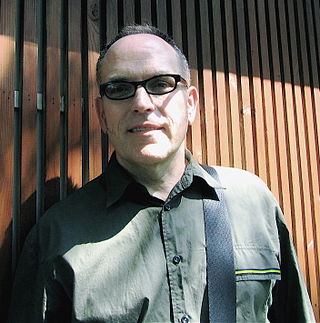
Alfred Harth, now known as Alfred 23 Harth or A23H, is a German multimedia artist, band leader, multi-instrumentalist musician, and composer who creatively mixes genres.

The Art Box is a six-CD box set by English avant-rock group Art Bears. It contains all Art Bears album and single releases, plus new material, including live and unreleased Art Bears tracks, and unreleased remixes and reworkings of Art Bears material by other musicians. The box set also contains a book of photographs, artwork, articles, interviews and commentary on the CD tracks, the work process, the band and their tour of Europe in 1979. The Art Bears material was recorded between 1978 and 1980, while the work by other musicians was recorded between 1998 and 2003. The box set was released in 2004 to commemorate the 25th anniversary of the band's formation. A double-CD entitled Art Bears Revisited containing Discs four and five of the box set was released later in 2004.
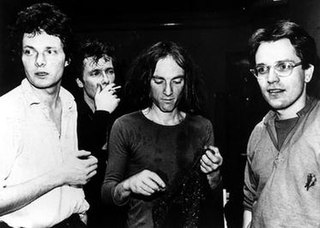
Cassiber were a German avant-rock group founded in 1982 by German composer and saxophonist Alfred Harth, German composer, music-theatre director and keyboardist Heiner Goebbels, English drummer Chris Cutler from Henry Cow and German guitarist Christoph Anders. They recorded five albums, toured extensively across Europe, Asia and North America, and disbanded in 1992.
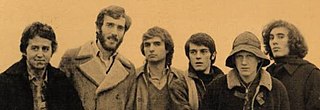
Stormy Six were an Italian progressive and folk rock band founded in Milan in 1966. They performed and recorded until 1983, mostly as a sextet but occasionally as a quartet, a quintet and a septet. Although their line-up changed considerably over the years, founding member Franco Fabbri remained with the group for its entire duration. In May 1993 they performed at a re-union concert in Milan, which was recorded and released on a CD, Un Concerto (1995).
Lutz Glandien is a German avant garde composer and musician based in Berlin. He has composed a number of classical and electroacoustic pieces, released four solo albums, and collaborated with English percussionist Chris Cutler to record two acclaimed avant-rock albums, Domestic Stories (1992) and p53 (1996).
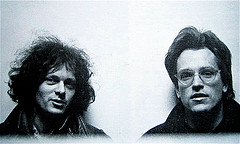
The Duo Goebbels/Harth (1975–1988), combining German composer, music-theatre director and keyboardist Heiner Goebbels and German composer, multi-media artist and saxophonist Alfred 23 Harth became famous for its adaptation of and departure from European composers, especially Hanns Eisler, implemented in a provocatively fresh manner into structured free improvisations and deploying content from areas beyond music. The duo was nicknamed the “Eisler brothers” by music critic W.Liefland. They later also experimented with different genres and sound collages, including electronic devices. The duo played in many international festivals and concerts in cities as diverse as Tel Aviv, Zagreb, West and East Berlin and South America.

The 40th Anniversary Henry Cow Box Set is a nine-CD plus one-DVD limited edition box set by English avant-rock group Henry Cow, and was released by RēR Megacorp in January 2009. It consists of almost 10 hours of previously unreleased recordings made between 1972 and 1978 from concerts, radio broadcasts, one-off projects, events and the studio. Included are new compositions, over four hours of free improvisation, and live performances of some of Henry Cow's original LP repertoire.
Catherine Jauniaux is a Belgian avant-garde singer. She has been described as a "one-woman-orchestra", a "human sampler", and "one of the best kept secrets in the world of improvised music". Her solo album, Fluvial (1983) is regarded as one of her most accomplished works. She was married to the late American experimental cellist and composer Tom Cora.

1982–1992 is a 2013 box set compilation album on Recommended Records commemorating the German new wave group Cassiber founded by Heiner Goebbels, Alfred Harth, Christoph Anders and Chris Cutler.
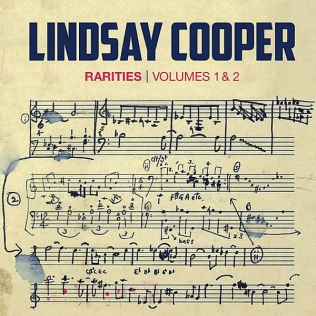
Rarities Volumes 1 & 2 is a 2014 posthumous double-CD compilation album of various pieces by English experimental musician and composer Lindsay Cooper. It was recorded between 1979 and 1992, and released in the UK and US by RēR Megacorp in 2014. The compilation was also released by ReR Megacorp in Japan in 2015.
The Sogenanntes Linksradikales Blasorchester was a wind band founded in 1976 in Frankfurt, Hesse, Germany, with a political program. It performed at protest demonstrations, Rock gegen Rechts, and the Russell Tribunal, among others. The professionals Heiner Goebbels, Alfred Harth, and Rolf Riehm were founders and regular players of the band, which made two recordings that were re-released in 1999. The group disbanded in 1981.

















